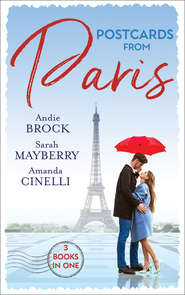По всем вопросам обращайтесь на: info@litportal.ru
(©) 2003-2025.
✖
The Christmas Wedding Quilt: Let It Snow / You Better Watch Out / Nine Ladies Dancing
Автор
Год написания книги
2019
Настройки чтения
Размер шрифта
Высота строк
Поля
By the time she pulled onto the road the snow was a thin sheen, but the asphalt was still clearly visible. Four-wheel drive or not, she took her time, not sure if ice had formed under the snow. Three miles down the road she realized that the road and the shoulder now seemed to be one. She could barely discern where her wheels should go, and unfortunately no one had yet come this way to mark the path with tracks.
She slowed even more and set her wipers up a notch, because the snow was falling faster. Fortunately her tires weren’t losing their grip, and signs helped her gauge where she ought to be. According to the rental car’s GPS she had twenty-two miles to go, and once she got to Hollymeade, all she had to do was find the key under a vase beside the door and settle in. She guessed there would be a few staples left from the last Miller to use the house. The great-uncle who had told her where to find the key had also assured her the power and water were never turned off, and the house and grounds were checked periodically. The house would be livable, and she would be welcome but alone. Nobody else was scheduled to visit until late January.
Now, as she gripped the steering wheel and gingerly guided the car through deepening snow, she tried to imagine that kind of freedom, that silence. Nobody but Rachel, Ella and her great-uncle, Albert, knew she was here.
Well, that wasn’t quite true. Eric Grant’s parents, who spent winters in Florida, knew. Eric’s mother, Lydia, had given her permission to rifle through the Grant’s lake house attic in search of Eric’s old baby quilts. In a flash of sentiment Jo had decided that incorporating Eric’s childhood into the quilt, along with Olivia’s, would make it even more meaningful. His mother had promised that anything Jo found that was too far gone to save for a grandbaby was fair game for the bridal quilt, and Lydia had promised not to breathe a word of the plan to her son or her daughter-in-law to be.
So Eric’s mom knew, but not her own. Jo had stretched the truth a bit and told Sophie she was on a spiritual retreat and not allowed to reveal the location. That was close enough to the truth that she didn’t feel she’d actually lied.
As for her boss? The only thing Frank Conner knew was that over the Christmas holidays Jo was taking some of the many vacation days the company owed her and would be available by email, but only for emergencies.
The last part was a gamble, but Jo had finally faced the fact that her skills and talents were largely unappreciated by her boss. And wasn’t some of that her own fault? For too many years she had taken Frank’s abuse without comment. It was time he realized how hard it would be to run his consulting firm without her. Even during the holidays, when work tapered off.
She came to a crossroads and slid to a stop, her heart thumping wildly until the wheels stopped spinning. She took a deep breath and carefully made the required left turn, fishtailing just a little, but straightening as she picked up speed.
Twenty minutes later the GPS promised she only had sixteen miles to go. At home sixteen miles meant something less than sixteen minutes, but here she was barely crawling. The same clouds shoveling snow over the landscape had now completely blocked the sun. She saw occasional lights from houses or businesses along the road, but no sign of driveways to reach them.
She wasn’t scared. Not exactly. The road wasn’t a major byway, but eventually there would be traffic. If the worst happened she could pull over—if she hadn’t already run off the road—and wait for a plow or state police car.
An hour later, after skidding three times and one time spinning wildly, she arrived at the turnoff to Hollymeade. At least that was what the friendly GPS was telling her. The only signs of a road were the ridges beside a slightly lower area that might well be the long winding driveway. She wasn’t sure she would recognize the turnoff in bright summer, but she had seen a sign to Kanowa Lake a mile back.
What choice did she have? There was a shape lurking far in the distance, like a monster waiting to pounce.
“Welcome to Hollymeade,” she whispered, as she turned into what she hoped was the driveway.
She was parked in front of the house before she took another deep breath. She couldn’t believe she had made it through the drifts of snow piling higher and higher. But here she was, the familiar old house just waiting for her. She had fought the elements and won. Memories of her childhood summers were in reach. She couldn’t wait to go inside.
Of course part of the reason she couldn’t wait was that cold was already seeping into the car, and the air wasn’t getting any warmer.
She reached for her jacket again, the warmest she owned, and wished she had taken the time to buy a better one. She leaned forward and shrugged into it, zipping it to the top before she opened the door and stepped outside.
Snow immediately filled her boots, which hadn’t been designed for blizzards. She pulled on lightweight leather gloves and grimaced as she opened the rear door and reached for her suitcase and groceries. She wondered how long she could make the three silly candy bars last.
Lifting the suitcase to keep it above the snow she trudged to the front steps, feet already turning numb. By the time she arrived she was winded but cheered. In a minute she would be inside, where she could take off her boots, turn up the heat and make herself a cup of something warm. Then she could explore to her heart’s content, choose a bedroom, make the bed and settle in for the night after a meal of corned beef hash or a bowl of cereal.
Gray canvas awning swaddled the wide front porch to keep the snow outside. She unzipped the doorway and hefted the suitcase in with her, zipping it behind her. Then she rolled the suitcase to the door and leaned it against the wall with her purse and grocery bag.
The vase where the key was hidden was farther from the door than she had anticipated, and the tented porch was so dark she had to feel her way along the wall with one hand to stay steady. But she reached it and lifted the vase.
No key.
She squatted, stripped off her gloves, and searched the floor with her fingertips. Only a cobweb wrapped itself around her fingers in welcome.
“Yuck.” As she stood she wiped her hand on her jeans. She was out of the wind and the snow, but cold was still her enemy. The temperature was probably in the twenties, and her clothes and feet were soaked.
No key, no light. While it was dark outside, it wasn’t this dark. She went back to the door and unzipped it again, tying back the flaps to let in what light she could. Then she carefully walked the length of the porch, lifting various knickknacks, a row of concrete ducklings, a plant stand, checking each for the key. She felt along every shelf on an empty book case at the end, opened the drawer on a small end table between two shiny metal chairs.
No key.
Now she was shivering. She pulled out her cell phone to call her great-uncle for advice, but there was no coverage. Either because of the storm or the rural location, she was on her own.
The town of Kanowa Lake lay beyond the house, perhaps three miles farther. There were other houses around the lake, of course, but most of them were summer cottages, many without heat. Now they were tented and locked tight, pipes drained and electricity turned off until warm weather brought them back to life. Without suitcase or groceries she trudged back down the steps, muddled through a snowdrift and peered into the distance, making a slow circle. Not a single light was visible.
Pushing down panic she considered her options. There were so few, and she was so cold, the process didn’t take long. Only one possibility made sense. She needed to get back up the driveway while she could. If she was lucky a snowplow would come by soon and she could follow it toward town. But that window of opportunity was quickly closing. She wasn’t sure she could turn around, and even then, she wasn’t sure she would make it back down the drive.
She donned her gloves and returned to the porch for her suitcase, groceries and purse, then, when the car had been packed again, went back one more time to snatch a snow shovel leaning against a wall.
The tracks from her car were already filling with snow. She certainly couldn’t back out of the driveway. She saw what looked like a turnaround just ahead of where she’d parked. If it was what it seemed, she could circle and head back up the driveway. But when she got in the driver’s seat and tried to inch forward, her wheels spun. She put the car in Reverse and rocked back a bit, then tried to move forward again. This time she made a little headway, but not enough.
She was about ten feet from the turnaround, which was about ten feet wide and ten feet long. Slamming her palm against the steering wheel she took a deep breath, then got out, grabbed the shovel from the backseat and went around to the front of the car. Her feet felt like they were on fire, and even with gloves, her hands felt cold enough to freeze to the shovel handle.
She worked as quickly as she could, shoveling the snow in front of both front tires. Then she started a track to the turnaround for one set of wheels. The snow was light enough, but she tired quickly. She’d had a long flight from California, a long drive from Buffalo, and now this. Rested and appropriately attired, she would have been more successful. But exhausted, with body temperature plummeting, every shovelful was a Herculean task.
At the turnaround she leaned on the shovel and bowed her head. Even if she was able to finish, would it do any good? Her tracks were almost invisible now. If she was able to move the car and turn it around, would she be able to make her way up the driveway? Then what? The road was probably piled with snow.
She hadn’t heard so much as a car passing, but as she tried to figure out the best option, she heard a distant rumble. Was it a plow? If she floundered through the snow up to the main road could she flag down the driver, explain her predicament, perhaps even get a ride into town?
The rumble deepened and grew louder. Dragging the shovel behind her, in case she needed it, she stomped up the driveway, stopping only for her purse. Ten yards later, ten grueling, numbing yards, she stopped again. Because suddenly she was no longer alone. A snowmobile was coming down the driveway with a lone, helmeted driver.
She wanted to cry from relief until she realized she was in the middle of nowhere in a blizzard with a stranger, and almost nobody knew she was here. Relief turned to apprehension.
The snowmobile pulled to a halt, and the broad-shouldered driver, clothed in appropriate gear, turned off the engine before he hopped down. For a moment he didn’t move; then he reached up and stripped off his helmet to reveal a wool stocking cap beneath it.
“Hello, Jo.”
This man was no stranger, although he was capable of causing a great deal of distress.
She didn’t know whether to laugh or cry. The last time she’d seen Brody Ryan, he had carefully and unemotionally explained the reasons why they couldn’t get married. Now, as then, she didn’t know what to say. She stared speechlessly for what seemed like forever, assessing the way the world seemed to be tilting on its axis. At last she settled for the obvious.
“Brody.”
“I guess ‘long time no see’ is a cliché.”
“What are you doing here?”
He smiled, a smile she remembered too well, creases that were almost dimples in his cheeks, laugh lines fanning out from green eyes.
“I guess I’m rescuing you. Looks to me like you might just need it.”
CHAPTER TWO
AS BRODY TENDED a fire in the living room fireplace, the shower on the second floor screeched to a halt. Jo must be getting out at last.
He tried to put that image out of his mind.
He was glad he had arrived when he did. By the time he’d managed the driveway Jo had been one stick short of a Popsicle, and by the time he’d unlocked the door to let her inside, she had been shivering uncontrollably. There had been no time to talk. He’d sent her right upstairs to shower and put on warm clothes, and he’d busied himself starting the fire, followed by a pot of coffee. There were few provisions in the Hollymeade pantry, but he’d scraped just enough grounds out of a canister for one pot. He knew Jo had brought next to no groceries with her, because once the fire and coffee were going, he’d retrieved her suitcase and a flimsy plastic bag from the car.
Now the suitcase was resting in the hallway outside the bathroom, and the pitiful groceries were resting on the kitchen counter.











